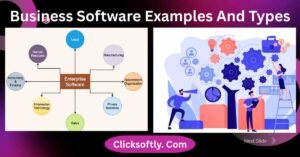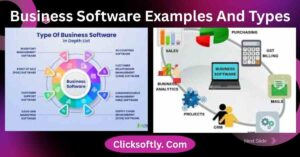Business Software Examples And Types are essential for streamlining operations and boosting productivity in 2025. This expert guide explores the best business software tools, categorized by function and industry, to help you choose the right solutions for your company’s needs.
Are you ready to transform your business operations and boost efficiency? The secret often lies in choosing the right software.
With countless options available, navigating the world of business software can feel overwhelming. But don’t worry, you’re not alone in this. Understanding the various types and examples of business software can be your game-changer.
Imagine streamlining your daily tasks, enhancing team collaboration, and increasing productivity—all by leveraging the right tools.
Intrigued? Keep reading to discover the perfect software solutions tailored for your business needs.
Enterprise Resource Planning (erp) Systems
Enterprise Resource Planning (ERP) Systems are like the backbone of modern business operations. They seamlessly integrate various business processes, from accounting and human resources to inventory and customer relationship management, into one cohesive system.
This integration helps businesses run more efficiently, making it easier to access accurate data and make informed decisions.

Business Software Examples And Types, Features Of Erp
ERP systems come packed with a plethora of features designed to streamline business operations. Automation is a key feature, reducing manual tasks and minimizing errors. Data centralization allows you to access real-time information from different departments in one place.
Another feature is customization, enabling businesses to tailor the ERP system to fit their specific needs. Scalability ensures that as your business grows, your ERP can grow with it. This adaptability makes ERP systems a long-term investment for businesses of all sizes.
Benefits Of Erp For Businesses
Implementing an ERP system can bring significant benefits to your business. One major advantage is enhanced productivity. With automation and streamlined processes, your team can focus on more strategic tasks rather than mundane, repetitive ones.
ERP systems also lead to better decision-making. With centralized data, you have a comprehensive view of your operations, helping you make well-informed choices. Have you ever thought about how much time and resources you could save by having all your business data in one place?
Additionally, ERP systems can lead to cost savings. By reducing inefficiencies and improving operational processes, you can optimize resource use and cut unnecessary expenses.
Business Software Examples And Types, Popular Erp Software Examples
There are several ERP software options available, each catering to different business needs. SAP ERP is one of the most widely used systems, known for its robust functionalities and flexibility.
Oracle ERP Cloud offers comprehensive financial and project management solutions, making it a favorite among larger enterprises. Microsoft Dynamics 365 is another popular choice, known for its seamless integration with other Microsoft products and user-friendly interface.
When choosing an ERP system, consider what features align with your business goals. Have you explored how an ERP could transform your operations? Making the right choice could be a game-changer for your business.
Customer Relationship Management (crm) Tools
In the world of business, managing relationships is crucial. Customer Relationship Management (CRM) tools help businesses organize, automate, and synchronize sales, marketing, customer service, and technical support. These tools are essential for companies that want to improve interactions with clients and streamline processes.
Key Functions Of Crm
CRM software stores customer data. It tracks interactions and manages customer relationships. This data helps businesses understand customer needs better. CRM tools automate tasks like sending emails. They remind sales teams about follow-ups. They also offer insights through data analysis.
Business Software Examples And Types, Advantages Of Crm Software
CRM software improves customer satisfaction. It provides better customer service. With CRM, businesses can personalize communication. This leads to stronger customer loyalty.
The software also increases efficiency. Teams can focus on selling rather than administrative tasks. CRM tools help in forecasting sales trends. This aids in planning and decision-making.
Leading Crm Software Examples
There are many CRM software options available. Salesforce is a popular choice. It offers a wide range of features. HubSpot provides user-friendly tools. It is great for small businesses.
Zoho CRM offers flexible pricing. It is suitable for various business sizes. Other examples include Microsoft Dynamics 365 and Pipedrive. Each has unique features and benefits.

Accounting And Finance Software
In the digital age, managing finances effectively is crucial for any business aiming for growth and sustainability. Accounting and finance software plays a vital role in streamlining financial operations. It simplifies tasks, enhances accuracy, and provides valuable insights into your financial health.
Core Features Of Accounting Software
Modern accounting software offers a range of core features designed to make financial management easier. Automation of repetitive tasks like data entry ensures accuracy and saves time. These tools typically include modules for invoicing, payroll, and tax calculation, ensuring you stay compliant with financial regulations.
Advanced reporting capabilities allow you to generate financial statements quickly. This helps in making informed decisions based on real-time data. The integration feature ensures seamless connection with other business systems, improving overall efficiency.
Business Software Examples And Types, Benefits For Financial Management
Accounting software provides significant benefits for financial management. By automating processes, you reduce human errors and increase productivity. This efficiency translates into cost savings, allowing you to allocate resources more effectively.
With detailed financial insights, you can make strategic decisions that propel your business forward. Enhanced accuracy in financial records also builds trust with stakeholders and investors. Are you leveraging these tools to gain a competitive edge?
Top Accounting Software Examples
Choosing the right accounting software can be a game-changer for your business. QuickBooks is a popular choice for small to medium-sized businesses, offering a user-friendly interface and comprehensive features. For larger enterprises, SAP offers robust solutions with customizable options.
Another excellent option is Xero, known for its cloud-based platform and strong customer support. FreshBooks is favored by freelancers and small business owners for its simplicity and effective invoicing capabilities. Which of these tools aligns with your business needs?
Whether you are a small business owner or managing a large corporation, accounting and finance software can revolutionize how you handle finances. Are you ready to enhance your financial management with the right tools?
Human Resource Management Systems (hrms)
Human Resource Management Systems (HRMS) play a crucial role in modern businesses. They streamline HR tasks, saving time and resources. HRMS enhance employee management, from hiring to retirement. These systems aid in handling payroll, benefits, and training.
Components Of Hrms, Business Software Examples And Types
An HRMS consists of various essential components. The core includes employee data management. This ensures accurate records of personal and professional details. Payroll processing is another key component. It manages salaries, deductions, and bonuses efficiently.
Benefits administration helps track employee perks like healthcare and retirement plans. Time and attendance tracking allows monitoring of work hours and leaves. Recruitment and onboarding streamline the hiring process. Performance management assists in evaluating employee achievements.
Hrms For Workforce Efficiency
HRMS boost workforce efficiency by automating routine tasks. They reduce manual paperwork and errors. Employees can access their information, improving transparency.
HRMS provide insights into workforce trends and patterns. This helps in making informed decisions. Efficient data management leads to better resource allocation. Streamlined processes enhance employee satisfaction and productivity.

Business Software Examples And Types, Notable Hrms Software Examples
Several HRMS software options are popular among businesses. One example is SAP SuccessFactors. It offers comprehensive HR functionalities. Another is Workday, known for its user-friendly interface. BambooHR is ideal for small to medium-sized businesses.
It provides intuitive HR solutions. ADP Workforce Now caters to large enterprises with diverse needs. Each software varies in features and capabilities. Selecting the right one depends on business size and requirements.
Business Software Examples And Types | Project Management Software
In today’s fast-paced business world, project management software has become an essential tool for teams striving to stay organized and meet deadlines.
These software solutions help streamline processes, facilitate communication, and keep everyone on the same page. Whether you’re managing a small team or overseeing complex projects, understanding the capabilities of project management tools can significantly enhance your workflow.
Essential Features Of Project Management Tools
Project management software comes with a range of features designed to improve productivity and collaboration. A task management system allows you to assign and track tasks effortlessly. You can also benefit from real-time communication tools that eliminate the need for constant email updates.
Another key feature is the ability to generate detailed reports. These reports give you insights into project progress, helping you make informed decisions. Customizable dashboards present data in a way that’s easy to understand, ensuring everyone can access the information they need.
Impact On Project Efficiency
Using project management software can dramatically boost your team’s efficiency. By centralizing all project information, you eliminate confusion and reduce the time spent searching for files or emails. Automated reminders and notifications ensure that deadlines are met, minimizing bottlenecks in your workflow.
Consider the impact on team morale when everyone knows exactly what they need to do and when. With clear priorities and responsibilities, team members are more confident and productive. Have you noticed how smoother communication leads to fewer misunderstandings and a more harmonious work environment?
Popular Project Management Software Examples
Several project management software options are available, each with unique strengths. Trello is a favorite for visual thinkers, offering boards and cards to organize tasks intuitively. If you’re looking for something that integrates well with other tools, Asana is a strong contender.
For teams that require detailed resource allocation, Microsoft Project provides robust capabilities. And if you’re focused on agile methodologies, Jira offers specialized features tailored to agile project management. Have you tried any of these tools? If so, what was your experience?
Investing time in exploring these software options can lead to a more organized, efficient, and productive team. Remember, the right tool can make all the difference in managing your projects successfully.
Supply Chain Management (scm) Software
Supply Chain Management (SCM) Software plays a crucial role in business. It helps organizations manage their supply chains efficiently. Businesses rely on SCM software to track goods from production to delivery.
This software optimizes processes, reduces costs, and improves customer satisfaction. It is essential for maintaining a competitive edge in today’s market.
Business Software Examples And Types, Functions Of Scm Software
SCM software offers various functions to enhance supply chain operations. It helps in inventory management, ensuring stock levels are optimal. Order processing is streamlined, reducing delays in delivery.
Demand forecasting analyzes trends to predict future needs. Supplier management tracks vendor performance and fosters good relationships. Transportation management optimizes routes and reduces shipping costs.
Scm For Streamlining Operations
SCM software significantly streamlines business operations. It automates repetitive tasks, freeing up time for employees. Real-time data provides insights into every stage of the supply chain.
Problems are identified quickly, allowing for swift resolutions. Collaboration between departments is improved, enhancing communication. This leads to better decision-making and increased efficiency.
Prominent Scm Software Examples
Several SCM software solutions are popular in the industry. SAP SCM is widely used for its comprehensive features. Oracle SCM provides robust tools for managing complex supply chains.
JDA Software focuses on intelligent supply chain planning. Infor Supply Chain Management is known for its user-friendly interface. Each software offers unique benefits tailored to business needs.
Collaboration And Communication Tools
Collaboration and communication tools play a vital role in modern businesses. They help teams work together smoothly, no matter where they are. These tools boost productivity and ensure everyone stays on the same page.
Features Of Collaboration Software
Collaboration software offers real-time messaging for instant communication. It includes file-sharing options, making document exchange simple. Users can also participate in video calls, enhancing face-to-face interaction. Task management features keep track of project progress efficiently.
Enhancing Team Communication
Effective tools improve communication among team members. They allow instant feedback, reducing misunderstandings. Team members can share ideas freely, fostering creativity. These tools ensure important information reaches everyone quickly.
Business Software Examples And Types, Examples Of Collaboration Tools
Slack is popular for its user-friendly messaging platform. Microsoft Teams offers integrated video calls and file sharing. Zoom provides high-quality video conferencing options. Trello helps manage tasks visually with boards and cards.
Business Intelligence (bi) Software
Business Intelligence (BI) Software is a game-changer for companies seeking to harness the power of data. It helps you turn raw data into actionable insights, empowering your decision-making process. Imagine having a tool that sifts through mountains of data to present you with clear and concise information—BI software does just that.
Key Elements Of Bi Tools
BI tools are more than just fancy dashboards and graphs. They are built on crucial elements such as data warehousing, data analysis, and reporting. Data warehousing collects and stores large amounts of data from different sources, making it easier for you to access and analyze.
Data analysis dives deep into these data sets to identify patterns and trends. Reporting then presents this information in a user-friendly format, allowing you to understand complex data effortlessly.
Have you ever wondered how businesses predict trends or customer behavior? BI tools are the secret weapon behind those insights.

Bi For Data-driven Decisions
Data-driven decisions are the backbone of successful businesses. BI software provides the insights needed to make informed choices. With accurate data at your fingertips, you can reduce risks and identify new opportunities.
Imagine having the confidence to back up your strategies with solid data. BI tools help eliminate guesswork, ensuring that your decisions are based on facts rather than assumptions. Wouldn’t you agree that making decisions based on real data is far more effective?
Business Software Examples And Types, video!
Examples Of Bi Software
There are several BI software solutions available, each with unique features. Tableau is popular for its intuitive and interactive dashboards, making data visualization a breeze. Power BI by Microsoft offers seamless integration with other Microsoft products, enhancing your workflow.
Looker, now part of Google Cloud, is praised for its robust data exploration capabilities. It allows you to dive deep into data without needing a technical background. Have you tried any of these tools, or are you considering one for your business?
BI software is not just for large corporations. Small and medium-sized businesses can also benefit significantly. With the right tool, you can unlock insights that propel your business forward. Wouldn’t it be exciting to see what data can do for your company?

Frequently Asked Questions
What Are The Main Types Of Business Software?
Business software includes CRM, ERP, project management, accounting, HR, and communication tools. These improve efficiency, collaboration, and customer management.
What Are The 10 Examples Of Application Software?
Examples of application software include Microsoft Word, Adobe Photoshop, Google Chrome, Slack, QuickBooks, Spotify, Zoom, AutoCAD, Skype, and Dropbox. These tools serve various purposes like document creation, image editing, web browsing, communication, accounting, music streaming, video conferencing, design, and file storage.
Which Of The Following Are Examples Of Business Software?
Business software examples include Microsoft Office, QuickBooks, Salesforce, Slack, Trello, Zoom, and Adobe Creative Cloud. These tools streamline tasks, enhance productivity, and support various business operations. Selecting the right software can improve efficiency and drive growth in your business.
What Are The 7 Types Of Application Software?
The 7 types of application software are word processors, spreadsheets, database management systems, presentation software, multimedia software, web browsers, and email clients. Each serves specific functions to enhance productivity and improve user experience.
Conclusion
Choosing the right business software is crucial. It can improve efficiency and productivity. Various software types cater to different needs. From accounting to project management, options abound. Each type serves a unique purpose. Consider your business goals first. Then, select software that aligns well.
Remember, investing in the right tools can save time and resources. Research and test before deciding. This ensures the best fit for your operations. Make informed choices for long-term success. Stay updated with technology trends. They can offer new solutions.
Embrace the right software to support your business journey.



Leave a Reply